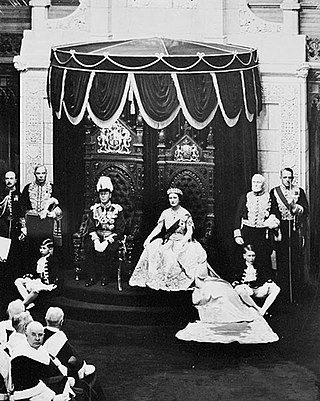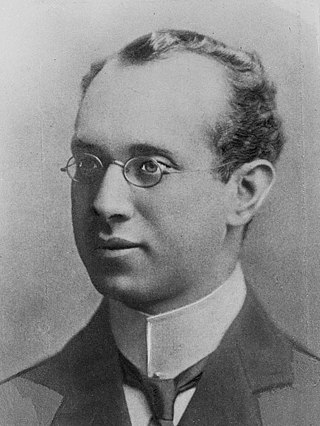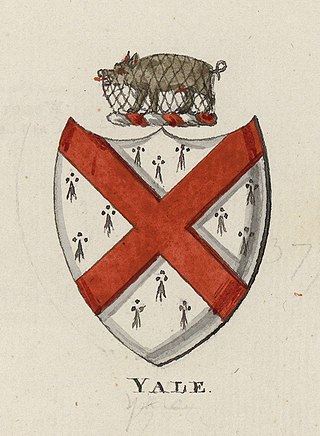
Daniel Isaac Greenberg CB (born 5 September 1965) has been the Parliamentary Commissioner for Standards since January 2023. [1] [2]

Daniel Isaac Greenberg CB (born 5 September 1965) has been the Parliamentary Commissioner for Standards since January 2023. [1] [2]
Daniel Greenberg was born in Golders Green, Northwest London and grew up in an Orthodox Jewish community. [3] He was educated at Trinity College, Cambridge, and the Inns of Court School of Law. [4]
His early career included time working in the Lord Chancellor's Department, the Office of the Parliamentary Counsel, [5] and the Office of Speaker's Counsel. [6] He recently served as counsel for domestic legislation in the House of Commons. [7]
He has also served as editor of Stroud's Judicial Dictionary (2000–2016) and Craies on Legislation (2004–2016), general editor of Jowitt's Dictionary of English Law (2010–2015) and the Annotated Statutes and Insight Encyclopaedia, editor-in-chief of the Statute Law Review (2012), [6] and contributing consultant editor to the Oxford English Dictionary.
Greenberg was appointed Companion of the Order of the Bath in the 2021 New Year Honours for services to Parliament. [8]
In January 2021, he wrote an editorial in The Jewish Chronicle criticising some Haredi Jewish groups for not following COVID-19 restrictions, in which he suggests that "any community that tolerates [ benefit fraud , covering up abuse, and breaking public health law ] has no connection with Jewish law or values and has become simply a self-indulgent and dangerous sect". [9]

English law is the common law legal system of England and Wales, comprising mainly criminal law and civil law, each branch having its own courts and procedures.

Royal assent is the method by which a monarch formally approves an act of the legislature, either directly or through an official acting on the monarch's behalf. In some jurisdictions, royal assent is equivalent to promulgation, while in others that is a separate step. Under a modern constitutional monarchy, royal assent is considered little more than a formality. Even in nations such as the United Kingdom, Norway, the Netherlands, Liechtenstein and Monaco which still, in theory, permit their monarch to withhold assent to laws, the monarch almost never does so, except in a dire political emergency or on advice of government. While the power to veto by withholding royal assent was once exercised often by European monarchs, such an occurrence has been very rare since the eighteenth century.

A Commonwealth realm is a sovereign state within the Commonwealth that has Charles III as its monarch and ceremonial head of state. All the realms are independent of the others, though one person, resident in the United Kingdom, acts as monarch of each. The phrase Commonwealth realm is an informal description not used in any law.

The monarchy of New Zealand is the constitutional system of government in which a hereditary monarch is the sovereign and head of state of New Zealand. The current monarch, King Charles III, acceded to the throne following the death of his mother, Queen Elizabeth II, on 8 September 2022 in the United Kingdom. The King's elder son, William, Prince of Wales, is the heir apparent.

Sir Charles Geoffrey Cox is a British Conservative Party politician and barrister who has been the Member of Parliament (MP) for Torridge and Tavistock, previously Torridge and West Devon, since 2005. Cox worked as a barrister from 1982 onwards and was appointed a Queen's Counsel in 2003, two years before his election to Parliament. He served as Attorney General for England and Wales and Advocate General for Northern Ireland under Theresa May and Boris Johnson from 2018 to 2020.

The Parliamentary Commissioner for Standards is an officer of the British House of Commons. The work of the officer is overseen by the Commons Select Committee on Standards.
Knight of the shire was the formal title for a member of parliament (MP) representing a county constituency in the British House of Commons, from its origins in the medieval Parliament of England until the Redistribution of Seats Act 1885 ended the practice of each county forming a single constituency. The corresponding titles for other MPs were burgess in a borough constituency and baron for a Cinque Ports constituency. Knights of the shire had more prestige than burgesses, and sitting burgesses often stood for election for the shire in the hope of increasing their standing in Parliament.

Sir James Martin, QC was three times Premier of New South Wales, and Chief Justice of New South Wales from 1873 to 1886.
This article is about the particular significance of the year 1948 to Wales and its people.
Cardiff was a parliamentary constituency centred on the town of Cardiff in South Wales which returned one Member of Parliament to the House of Commons from 1542 until it was abolished for the 1918 general election.

Southwark was a constituency centred on the Southwark district of South London. It returned two Members of Parliament to the House of Commons of the English Parliament from 1295 to 1707, to the Parliament of Great Britain from 1707 to 1800, and to the UK Parliament until its first abolition for the 1885 general election. A seat of the same name, covering a smaller area than the last form of the earlier seat in the west of the original and beyond its boundaries to the southwest, was created in 1950 and abolished in 1974.
Cricklade was a parliamentary constituency named after the town of Cricklade in Wiltshire.

Sir Julian Emanuel Salomons was a barrister, royal commissioner, Solicitor General, Chief Justice and member of parliament. He was the only Chief Justice of New South Wales to be appointed and resign before he was ever sworn into office. Salomons was said to be short of stature and somewhat handicapped by defective eyesight. However, he had great industry, great powers of analysis, a keen intellect and unbounded energy and pertinacity. His wit and readiness were proverbial, and he was afraid of no judge.

An Act of Parliament in the United Kingdom is primary legislation passed by the UK Parliament in Westminster, London.

Rabbi Doctor Eugene B. Korn is a lecturer, scholar and educator. He lives in Jerusalem and was formerly Academic Director of the Center for Jewish-Christian Understanding and Cooperation (CJCUC) in Jerusalem. He was also co-director of its Institute for Theological Inquiry. Korn was the founding editor of Meorot: A Forum for Modern Orthodox Discourse, based at Yeshivat Chovevei Torah in New York City.
Sir Thomas Edlyne Tomlins was an English legal writer.

Sir Daniel Levy was an Australian politician.

Solicitor General for New South Wales, known informally as the Solicitor General, is one of the Law Officers of the Crown, and the deputy of the Attorney General. They can exercise the powers of the Attorney General in the Attorney General's absence. The Solicitor General acts alongside the Crown Advocate, and Crown Solicitor, and serves as one of the legal and constitutional advisers of the Crown and its government in the Australian state of New South Wales.

David Eryl Corbet Yale,, Hon. QC was a scholar in the history of English law. He became Queen's Counsel at the same time as Nelson Mandela, and became president of the Selden Society. He was also a reader in English legal history at Cambridge University from 1969 to 1993, and a life fellow at Christ's College, Cambridge from 1950 until his death.

The Constitution of New South Wales is composed of both unwritten and written elements that set out the structure of Government in the State of New South Wales. While the most important parts are codified in the Constitution Act 1902, major parts of the broader constitution can also be found in: